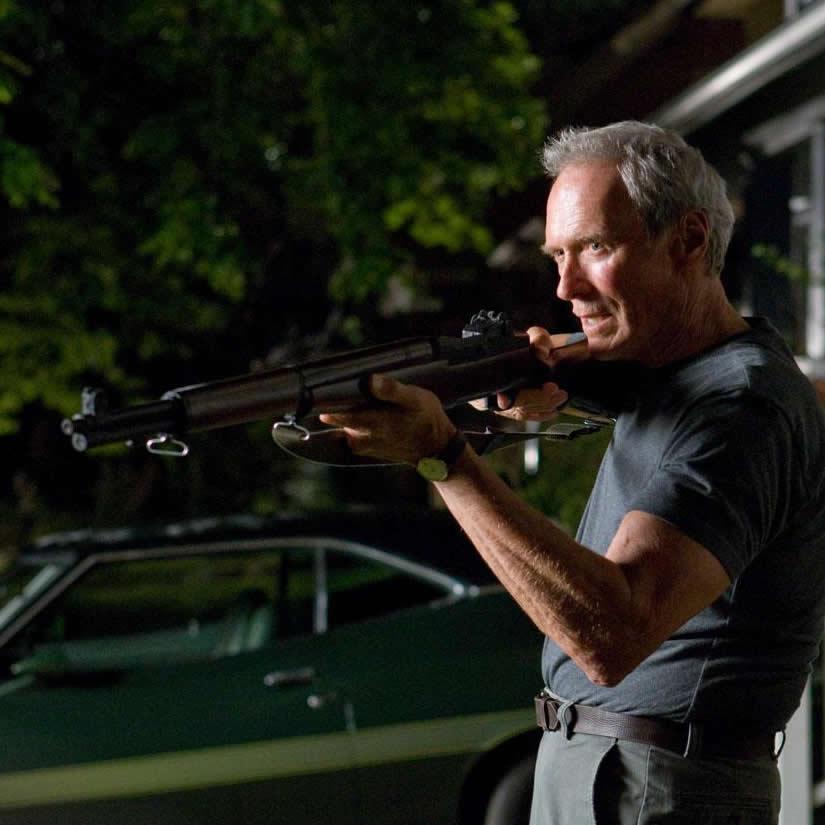Crotchety. Curmudgeonly. Cantankerous. Clint. Throw ‘shotgun-wielding,’ ‘bile-tongued’ and ‘ass-kicking’ into the mix and you have both a plot summary of and a list of reasons to see Gran Torino, Eastwood’s first film serving dual duties as director and thesp since the Oscar-storming haymaker of 2004’s Million Dollar Baby.
In what at first glance seems like a self-reflexive bid for a slot in the sequel to Grindhouse, Eastwood stars as the grizzled Korean War vet, Walt Kowalski, recent widower and unabashed xenophobe. Walt’s children don’t respect him, their children even less, his disaffected granddaughter even calling dibs on his furniture at her own grandmother’s wake. Though as consuming as his contempt is for these self-serving ingrates, it’s his Hmong neighbours for whom he saves his purest disdain, the blindly intolerant Walt a former Ford factory worker and patriotic muscle car enthusiast whose career was given a bum steer with the proliferation of the Japanese auto industry. To him, all “gooks” are practically transposable – they either ruined his livelihood or made his life hell in the war. So when Thao (Bee Vang), the young boy next door, in a reluctant act of gang initiation, tries to pilfer his coveted ‘72 Gran Torino, Walt instinctively finds himself reaching for his rifle, and the subsequent face-off with some neighbourhood gangbangers (“Get off my lawn,” Eastwood snarls, glaring hellfire down the sight of his weapon) improbably places him as the unlikely saviour of the very would-be thief against whom he bears such a powerful grudge.
There are such big issues at play here that once we get past the novelty of a racist, old Eastwood sending up our expectations of his on-screen persona, we settle in for what must be another of the director’s classically-styled and pertinent dramas, but Gran Torino gradually reveals itself as another beast entirely, a winning midpoint between the pistol-slinging anti-heroics of his most memorable work as an actor and the pithy elegance that’s typified his career behind camera. So instead of the swelling dread of Mystic River or the solemnity of Unforgiven, we get an unexpectedly funny revenge-cum-morality dramedy that’s all the sharper for its complete lack of sermonising” even the ‘reformed’ Walt makes no effort to hold back on the cascading racial slurs, the jibes now delivered sans vitriol though with a middle digit still squared firmly in the face of patronising political correctness.
If subtlety has never been an Eastwood strong suit, there’s nowhere it’s more discernible (or appropriate) than here, and the actor/director’s streamlined, no B.S. approach rests easily with Nick Schenk’s refreshingly maudlin-free screenplay. Of course, there are missteps (a pose rife with messianic connotations a rare eye-roller in an otherwise solidly-handled third act, the script’s reliance on the timeworn ‘old guy with a cough’ bit), though they quietly niggle rather than openly distract. The same can be said for some of the performances from the largely unprofessional cast, with Vang and Ahney Her as his sister, Sue, coming off best, the latter playing chaperone during Walt’s introduction to Hmong customs and culture and later utterly selling an act of shocking brutality.
If this is indeed (as the star himself has suggested) Eastwood’s final appearance on-screen, it’s not hard to see why Gran Torino would have appealed to the man who, as a performer, has made an art out of doing the right thing the wrong way. Walt might be neither Harry Callahan nor The Man with No Name, but he subscribes to the same school of morally ambiguous justice, and his ballsy, lone soldier, throw-the-book-out-the-window sign-off provides the perfect swansong for Eastwood the actor, ever the unshakable leading man.
DIRECTOR: Clint Eastwood
SCREENWRITER: Nick Schenk
CAST: Clint Eastwood, Bee Vang, Ahney Her, Christopher Carley, John Carroll Lynch
RATING: M
RUN TIME: 116 minutes
Actors:
Director:
Format:
Country:
Release:





